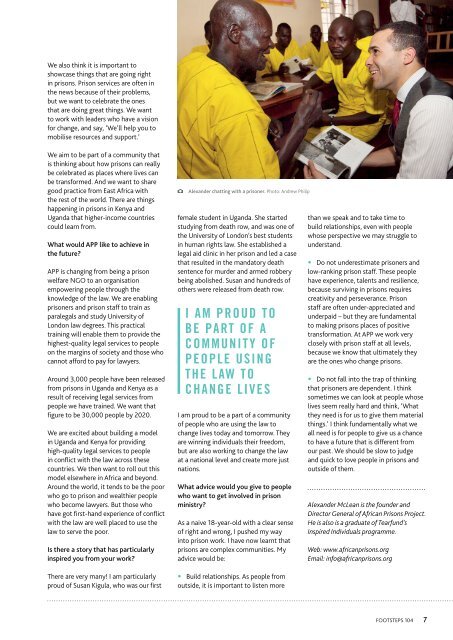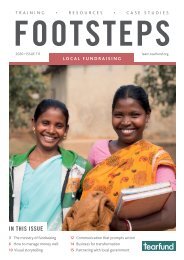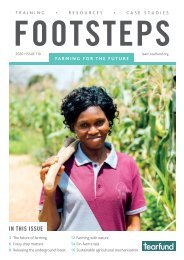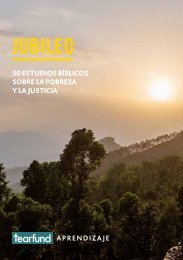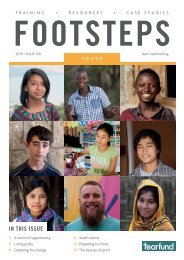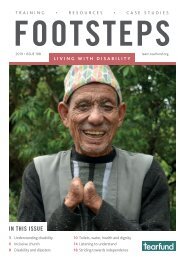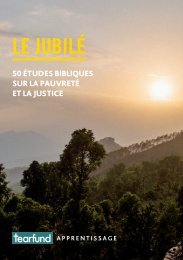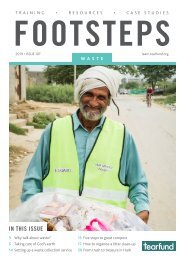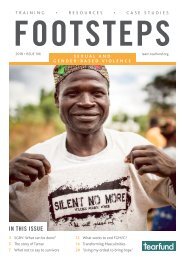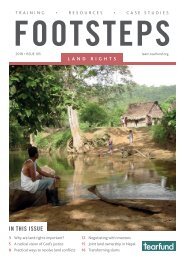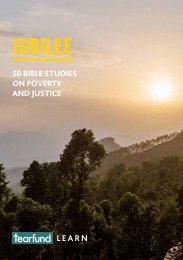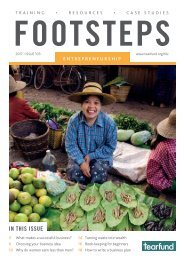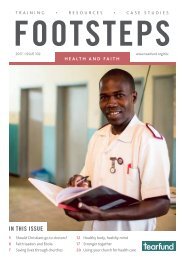Footsteps 104: Prisons
Footsteps 104 features practical tips for getting involved in prison ministry and caring for ex-offenders.
Footsteps 104 features practical tips for getting involved in prison ministry and caring for ex-offenders.
You also want an ePaper? Increase the reach of your titles
YUMPU automatically turns print PDFs into web optimized ePapers that Google loves.
We also think it is important to<br />
showcase things that are going right<br />
in prisons. Prison services are often in<br />
the news because of their problems,<br />
but we want to celebrate the ones<br />
that are doing great things. We want<br />
to work with leaders who have a vision<br />
for change, and say, ‘We’ll help you to<br />
mobilise resources and support.’<br />
We aim to be part of a community that<br />
is thinking about how prisons can really<br />
be celebrated as places where lives can<br />
be transformed. And we want to share<br />
good practice from East Africa with<br />
the rest of the world. There are things<br />
happening in prisons in Kenya and<br />
Uganda that higher-income countries<br />
could learn from.<br />
What would APP like to achieve in<br />
the future?<br />
APP is changing from being a prison<br />
welfare NGO to an organisation<br />
empowering people through the<br />
knowledge of the law. We are enabling<br />
prisoners and prison staff to train as<br />
paralegals and study University of<br />
London law degrees. This practical<br />
training will enable them to provide the<br />
highest-quality legal services to people<br />
on the margins of society and those who<br />
cannot afford to pay for lawyers.<br />
Around 3,000 people have been released<br />
from prisons in Uganda and Kenya as a<br />
result of receiving legal services from<br />
people we have trained. We want that<br />
figure to be 30,000 people by 2020.<br />
We are excited about building a model<br />
in Uganda and Kenya for providing<br />
high-quality legal services to people<br />
in conflict with the law across these<br />
countries. We then want to roll out this<br />
model elsewhere in Africa and beyond.<br />
Around the world, it tends to be the poor<br />
who go to prison and wealthier people<br />
who become lawyers. But those who<br />
have got first-hand experience of conflict<br />
with the law are well placed to use the<br />
law to serve the poor.<br />
Is there a story that has particularly<br />
inspired you from your work?<br />
There are very many! I am particularly<br />
proud of Susan Kigula, who was our first<br />
Alexander chatting with a prisoner. Photo: Andrew Philip<br />
female student in Uganda. She started<br />
studying from death row, and was one of<br />
the University of London’s best students<br />
in human rights law. She established a<br />
legal aid clinic in her prison and led a case<br />
that resulted in the mandatory death<br />
sentence for murder and armed robbery<br />
being abolished. Susan and hundreds of<br />
others were released from death row.<br />
I AM PROUD TO<br />
BE PART OF A<br />
COMMUNITY OF<br />
PEOPLE USING<br />
THE LAW TO<br />
CHANGE LIVES<br />
I am proud to be a part of a community<br />
of people who are using the law to<br />
change lives today and tomorrow. They<br />
are winning individuals their freedom,<br />
but are also working to change the law<br />
at a national level and create more just<br />
nations.<br />
What advice would you give to people<br />
who want to get involved in prison<br />
ministry?<br />
As a naive 18-year-old with a clear sense<br />
of right and wrong, I pushed my way<br />
into prison work. I have now learnt that<br />
prisons are complex communities. My<br />
advice would be:<br />
••<br />
Build relationships. As people from<br />
outside, it is important to listen more<br />
than we speak and to take time to<br />
build relationships, even with people<br />
whose perspective we may struggle to<br />
understand.<br />
••<br />
Do not underestimate prisoners and<br />
low-ranking prison staff. These people<br />
have experience, talents and resilience,<br />
because surviving in prisons requires<br />
creativity and perseverance. Prison<br />
staff are often under-appreciated and<br />
underpaid – but they are fundamental<br />
to making prisons places of positive<br />
transformation. At APP we work very<br />
closely with prison staff at all levels,<br />
because we know that ultimately they<br />
are the ones who change prisons.<br />
••<br />
Do not fall into the trap of thinking<br />
that prisoners are dependent. I think<br />
sometimes we can look at people whose<br />
lives seem really hard and think, ‘What<br />
they need is for us to give them material<br />
things.’ I think fundamentally what we<br />
all need is for people to give us a chance<br />
to have a future that is different from<br />
our past. We should be slow to judge<br />
and quick to love people in prisons and<br />
outside of them.<br />
Alexander McLean is the founder and<br />
Director General of African <strong>Prisons</strong> Project.<br />
He is also is a graduate of Tearfund’s<br />
Inspired Individuals programme.<br />
Web: www.africanprisons.org<br />
Email: info@africanprisons.org<br />
FOOTSTEPS <strong>104</strong><br />
7


